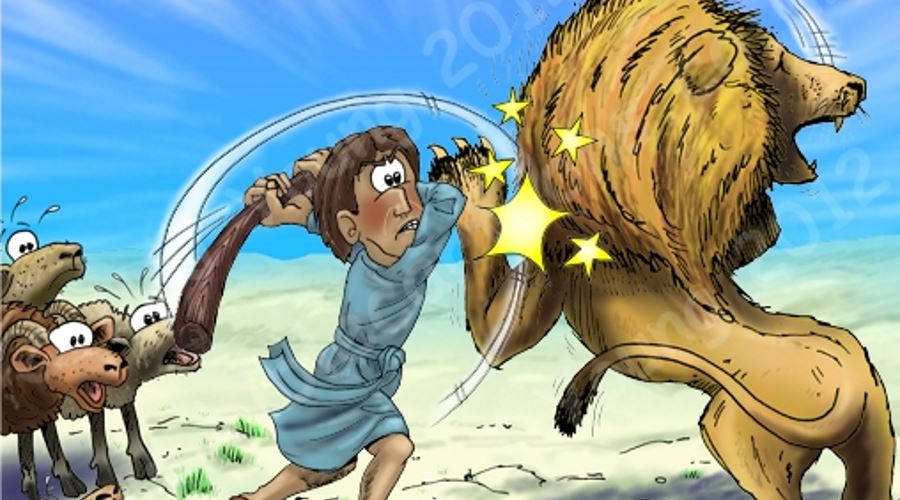When David was arguing for the right to face Goliath, he mentioned that he had already killed a lion and a bear (I Samuel 17.34-37). He went into great detail about how he snatched a lamb from the very mouth of the beast, and, grabbing the predator by the hair, struck and killed it. He attributes this remarkable behavior to the presence and power of God, not to any bravery or skill on his part. Facing the lion and the bear were necessities for David. As shepherd, it was his responsibility to protect his flock.
II Samuel 23.20 tells us that one of David’s mighty men was famous for killing a lion as well. After David’s death, II Samuel lists his “mighty men.” Benaiah’s greatest achievement is “climbing into a pit to face a lion on a snowy day.” What an intriguing picture that paints. How did the lion come to be in the pit? If the lion was safely confined in a pit why was Benaiah compelled to climb down and face it? Where was he, that this battle took place on a snowy day?
Perhaps the most hilarious chapter in Cervantes’ Don Quixote is the episode where his hero faces a ferocious and hungry lion. The chapter (Book 2, chapter 17) begins with his squire, Sancho Panza buying curds, and putting them in his master’s helmet (which is, after all, just a barber’s bowl). When Don Quixote seizes the helmet quickly to prepare for battle he smashes the bowl of cottage cheese on his own head. Don Quixote then stops a caravan bringing two African lions (a male and a female) to the King of Spain. They are due to eat soon and are hungry. Don Quixote insists that the male lion be released, and he bravely stands to face it. When the lion is released he stretches, yawns, washes his face like a house-cat, turns his rump towards his adversary, and lays down for a nap.
We think of lions as sitting atop the food chain. They are the “king of beasts” in our imagination. Lions are big cats, and even medium sized cats are frightening. Would any of us think of cuddling up to a cat as large as Golden Retriever, or a Saint Bernard? We may laugh at Don Quixote, but we do not doubt his bravery.
Cervantes’ Knight-errant is fictional. David and Benaiah were flesh, blood and bone men. We read of their encounters with awe. We wonder at the rare bravery such men possess. We must use our imagination to ponder persons of such bravery because few of us possess it. Thus David and Benaiah become mythical figures....like Paul Bunyan or Hercules. We cease to think of them as persons of common abilities and challenges.
This raises two large concerns. The first is that we treat the Bible like Nathaniel Hawthorn’s Wonder Book – a collection of fantastic myths. The second is that we forget we face the lion every day.
Your adversary, the devil, prowls around like a roaring lion looking for someone to devour. Resist him, standing firm in the faith, because you know that your brothers throughout the world are undergoing the same kind of sufferings. I Peter 5.8-9.
Nothing could be more common than facing a lion, on snowy days and sunny ones. Nothing is more universal than the need to battle a lion. Facing a lion is as quotidian a task as brushing your teeth, or bringing in the mail. And yet it is no less fraught with danger than we imagine facing a lion might be. Our spiritual lives are at risk. We will not survive if we are not even aware of being stalked. But if we stand and fight, this lion will flee (James 4.7).
As David understood, God makes us equal to the task if we will take our stand. That power is commonly available. But we must be aware. We must make a stand.


